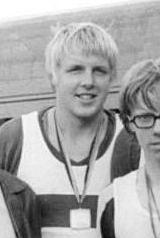- 1974:
 (Dobler, Lehmann, Richter, Schwede, Ahrenholz, Müller, Blanke, Mosig, cox Brincker) (Dobler, Lehmann, Richter, Schwede, Ahrenholz, Müller, Blanke, Mosig, cox Brincker) - 1975:
 (Goretzki, Knetsch, Richter, Schwede, Kallies, Neu, Nitsche, Mosig, cox Wilke) (Goretzki, Knetsch, Richter, Schwede, Kallies, Neu, Nitsche, Mosig, cox Wilke) - 1977:
 (Bügel, Steindorf, Lohs, Neisser, Sandig, Kurth, Schwede, Metze, cox Heß) (Bügel, Steindorf, Lohs, Neisser, Sandig, Kurth, Schwede, Metze, cox Heß) - 1978:
 (Yermakova, Paziun, Antoniuk, Bunjak, Dergatchenko, Umanets, Tereshina, Pivovarova, cox Frolova) (Yermakova, Paziun, Antoniuk, Bunjak, Dergatchenko, Umanets, Tereshina, Pivovarova, cox Frolova) - 1979:
 (Antoniuk, Bunjak, Dergatchenko, Yermakova, Paziun, Tereshina, Umanets, Pivovarova, cox Frolova) (Antoniuk, Bunjak, Dergatchenko, Yermakova, Paziun, Tereshina, Umanets, Pivovarova, cox Frolova) - 1981:
 (Baltutite, Teterina, Tereshina, Yatsenko, Makushkina, Shvetsova, Umanets, Paziun, cox Frolova) (Baltutite, Teterina, Tereshina, Yatsenko, Makushkina, Shvetsova, Umanets, Paziun, cox Frolova) - 1982:
 (Makushkina, Konopleva, Umanets, Tereshina, Yatsenko, Studneva, Doligaida, Stone, cox Frolova) (Makushkina, Konopleva, Umanets, Tereshina, Yatsenko, Studneva, Doligaida, Stone, cox Frolova) - 1983:
 (Stone, Averyanova, Konopleva, Studneva, Umanets, Tereshina, Yatsenko, Makushkina, cox Khokhlova) (Stone, Averyanova, Konopleva, Studneva, Umanets, Tereshina, Yatsenko, Makushkina, cox Khokhlova) - 1985:
 (Pukhayeva, Zakyrova, Tereshina, Suprun, Znak, Teterina, Yatsenko, Averyanova, cox Khokhlova) (Pukhayeva, Zakyrova, Tereshina, Suprun, Znak, Teterina, Yatsenko, Averyanova, cox Khokhlova) - 1986:
 (Tereshina, Suprun, Sakirova, Pukhayeva, Znak, Teterina, Averyanova, Tsessiunaite, cox Khokhlova) (Tereshina, Suprun, Sakirova, Pukhayeva, Znak, Teterina, Averyanova, Tsessiunaite, cox Khokhlova) - 1987:
 (Vîrlan, Trașcă, Țicanu, Arba, Chelariu, Necula, Homeghi, Toader, cox Oancia) (Vîrlan, Trașcă, Țicanu, Arba, Chelariu, Necula, Homeghi, Toader, cox Oancia) - 1989:
 (Bălan, Curelea, Tănase, Soare, Chelariu, Neculai, Leonte, Armășescu, cox Oancia) (Bălan, Curelea, Tănase, Soare, Chelariu, Neculai, Leonte, Armășescu, cox Oancia) - 1990:
 (Șnep, Bobeică, Burcică, Cochela, Curela, Oprea, Popescu, Ciucanu-Robu, cox Nedelcu) (Șnep, Bobeică, Burcică, Cochela, Curela, Oprea, Popescu, Ciucanu-Robu, cox Nedelcu) - 1991:
 (Barnes, Delehanty, Doey, Heddle, Mahon, McBean, Monroe, Taylor, cox Thompson) (Barnes, Delehanty, Doey, Heddle, Mahon, McBean, Monroe, Taylor, cox Thompson) - 1993:
 (Alupei, Bobeică, Cochela, Doroftei, Ignat, Neculai, Olteanu, Tănase, cox Ilie) (Alupei, Bobeică, Cochela, Doroftei, Ignat, Neculai, Olteanu, Tănase, cox Ilie) - 1994:
 (Haacker, Klapheck, Schmidt, Martin, Pyritz, Rehaag, Wagner, Werremeier, cox Schnell) (Haacker, Klapheck, Schmidt, Martin, Pyritz, Rehaag, Wagner, Werremeier, cox Schnell) - 1995:
 (Dore, Fallon, Fuller, Kakela, Korholz, E. McCagg, M. McCagg, Tranel-Michini, cox Farooq) (Dore, Fallon, Fuller, Kakela, Korholz, E. McCagg, M. McCagg, Tranel-Michini, cox Farooq) - 1997:
 (Damian, Susanu, Olteanu, Cazac, Gafencu, Cochela, Ignat, Tănase, cox Georgescu) (Damian, Susanu, Olteanu, Cazac, Gafencu, Cochela, Ignat, Tănase, cox Georgescu) - 1998:
 (Cazac, Cochela, Damian, Dumitrache, Gafencu, Ignat, Olteanu, Susanu, cox Georgescu) (Cazac, Cochela, Damian, Dumitrache, Gafencu, Ignat, Olteanu, Susanu, cox Georgescu) - 1999:
 (Damian, Dumitrache, Ignat, Olteanu, Popescu, Spîrcu, Susanu, Bărăscu, cox Georgescu) (Damian, Dumitrache, Ignat, Olteanu, Popescu, Spîrcu, Susanu, Bărăscu, cox Georgescu) - 2001:
 (Winter, Lutz, Wilson, Robinson, Martin, Sattin, Roberts, Larsen, cox Bilson) (Winter, Lutz, Wilson, Robinson, Martin, Sattin, Roberts, Larsen, cox Bilson) - 2002:
 (Johnson, Peirce, Davies, Urtasun, Marten, Cox, Mickelson, Mackenzie, cox Whipple) (Johnson, Peirce, Davies, Urtasun, Marten, Cox, Mickelson, Mackenzie, cox Whipple) - 2003:
 (Hipler, Pyritz, Tucholke, Holthaus, Schmidt, Zimmermann, Günther, Wech, cox Ruppel) (Hipler, Pyritz, Tucholke, Holthaus, Schmidt, Zimmermann, Günther, Wech, cox Ruppel) - 2005:
 (Outhwaite, Selby Smith, Mills, Hornsey, Martin, Chew, Frasca, Heard, cox Patrick) (Outhwaite, Selby Smith, Mills, Hornsey, Martin, Chew, Frasca, Heard, cox Patrick) - 2006:
 (Sickler, Cooke, Goodale, Shoop, Mickelson, Francia, Lind, Davies, cox Whipple) (Sickler, Cooke, Goodale, Shoop, Mickelson, Francia, Lind, Davies, cox Whipple) - 2007:
 (Sickler, Shoop, Goodale, Magee, Mickelson, Francia, Lind, Davies, cox Whipple) (Sickler, Shoop, Goodale, Magee, Mickelson, Francia, Lind, Davies, cox Whipple) - 2009:
 (Cafaro, Allen, Larsen-Strecker, Francia, Goodale, Shoop, Lind, Glessner, cox Snyder) (Cafaro, Allen, Larsen-Strecker, Francia, Goodale, Shoop, Lind, Glessner, cox Snyder) - 2010:
 (Goodale, Polk, Redman, Ritzel, Lofgren, Logan, Musnicki, Glessner, cox Whipple) (Goodale, Polk, Redman, Ritzel, Lofgren, Logan, Musnicki, Glessner, cox Whipple) - 2011:
 (Lofgren, Francia, Musnicki, Ritzel, Redman, Polk, Lind, Logan, cox Whipple) (Lofgren, Francia, Musnicki, Ritzel, Redman, Polk, Lind, Logan, cox Whipple) - 2013:
 (Polk, Simmonds, Regan, Schmetterling, Luczak, Musnicki, Opitz, Lind, cox Snyder) (Polk, Simmonds, Regan, Schmetterling, Luczak, Musnicki, Opitz, Lind, cox Snyder) - 2014:
 (Opitz, Musnicki, Polk, Schmetterling, Luczak, Lind, Logan, Robbins, cox Snyder) (Opitz, Musnicki, Polk, Schmetterling, Luczak, Lind, Logan, Robbins, cox Snyder) - 2015:
 (Opitz, Musnicki, Polk, Schmetterling, Regan, Simmonds, Gobbo, Robbins, cox Snyder) (Opitz, Musnicki, Polk, Schmetterling, Regan, Simmonds, Gobbo, Robbins, cox Snyder) - 2017:
 (Vrînceanu, Bejinariu, Petrilă, Popa, Bereș, Tîlvescu, Boguș, Oprea, cox Druncea) (Vrînceanu, Bejinariu, Petrilă, Popa, Bereș, Tîlvescu, Boguș, Oprea, cox Druncea) - 2018:
 (O'Brien, Mueller, Opitz, Doonan, Moffat, Eisser, Regan, Coffey, cox Guregian) (O'Brien, Mueller, Opitz, Doonan, Moffat, Eisser, Regan, Coffey, cox Guregian) - 2019:
 (Greenslade, Dyke, Spoors, Bevan, Prendergast, Williams, Ross, Gowler, cox Shepherd) (Greenslade, Dyke, Spoors, Bevan, Prendergast, Williams, Ross, Gowler, cox Shepherd) - 2022:
 (Rusu, Buhuș, Ailincăi, Tivodariu, M. Bereș, A. Bereș, Vrînceanu, Radiș, cox Petreanu) (Rusu, Buhuș, Ailincăi, Tivodariu, M. Bereș, A. Bereș, Vrînceanu, Radiș, cox Petreanu) - 2023:
 (Rusu, Anghel, Adam, Buhuș, M. Bereș, Tivodariu, Vrînceanu, A. Bereș, cox Petreanu) (Rusu, Anghel, Adam, Buhuș, M. Bereș, Tivodariu, Vrînceanu, A. Bereș, cox Petreanu)
|





